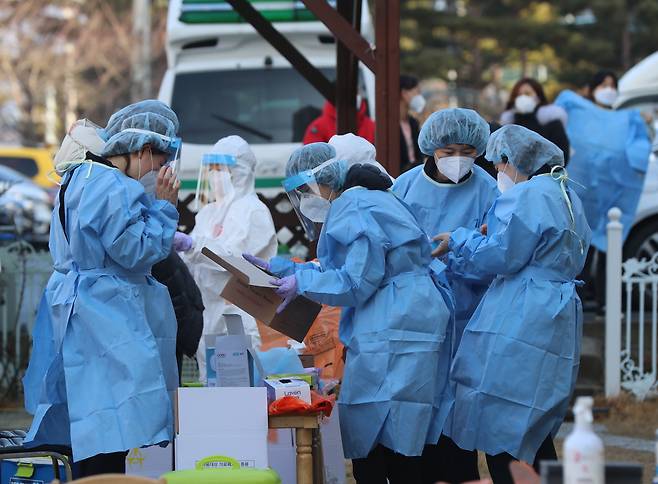Korea's COVID-19 numbers fall, but risks still loom
이 글자크기로 변경됩니다.
(예시) 가장 빠른 뉴스가 있고 다양한 정보, 쌍방향 소통이 숨쉬는 다음뉴스를 만나보세요. 다음뉴스는 국내외 주요이슈와 실시간 속보, 문화생활 및 다양한 분야의 뉴스를 입체적으로 전달하고 있습니다.

The number of official cases of the novel coronavirus in South Korea is so far on a downward slope, but risks of a fresh flare-up are still imminent, health officials and experts say.
Korea on Sunday confirmed 369 locally transmitted and 23 imported cases of COVID-19, according to the Korea Disease Control and Prevention Agency situation report, bringing the cumulative total to 75,084. Twelve more people died, pushing the death toll to 1,349.
The national health agency’s deputy director Kwon Jun-wook warned over the weekend that the emergence of the more contagious variants could force Korea to “relive the nightmares of December.”
To date, Korea has detected 18 cases of the mutant strain among passengers from Brazil, South Africa and the UK, according to the latest government data. Kwon said the agency was investigating the potential of the new variants to affect the monoclonal antibody treatment that is being developed at home.
“The challenges of the pandemic are only growing, muddying projections of what’s to come,” he said, urging the public to continue their compliance with safety protocols.
Virologist Dr. Paik Soon-young said the new strains were highly transmissible based on trends observed overseas.
“There has been no confirmed case of the new mutant strain spreading locally here -- so far. But it’s only a matter of time (before that happens),” he said.
“This is why immunization efforts must proceed as promptly as possible. We’re in a race against time,” he said, urging the government to be more transparent with disclosing its vaccination timeline.
The first batch of COVID-19 vaccines are expected to arrive here in a few weeks, with inoculations set to begin either late February or early March. The government has yet to announce exactly how many doses of which vaccines will be arriving by when.
Another spike in COVID-19 cases may follow as businesses reopen, along with higher risks of contagion, according to respiratory disease specialist Dr. Chun Eun-mi. Cafes, karaoke lounges and indoor sport facilities have been allowed to reopen starting Jan. 18 as business owners protested against closures that have gone uncompensated.
“The relaxation in regulations on Monday may easily backfire, the impact of which will manifest in the coming week or two,” the pulmonologist at Ewha Womans University Medical Center in southwestern Seoul said.
Chun added that the high proportion of asymptomatic cases among current outbreaks signaled the situation could be worse than the figures suggest.
As many as 32.1 percent of 1,790 recently diagnosed patients in Seoul were asymptomatic, according to city data released Friday, and 45.6 percent of the asymptomatic patients had tested positive without ever coming into contact with a confirmed patient.
“These are patients who may have gone undetected had they not sought testing voluntarily, as they don’t display visible signs of illness and have no links to officially identified cases,” she said.
The forthcoming Lunar New Year, when millions of Koreans flock across the country, also poses risks, said preventive medicine professor Dr. Jung Jae-hun of Gachon University in Gyeonggi Province.
“The control measures in place right now are likely necessary through the big holiday,” he said. “It’s best to refrain from traveling and visiting family this Seollal.”
The government said in a press briefing last week that the decision on whether to maintain or slacken social distancing rules will be announced Jan. 31, ahead of the holiday that falls on Feb. 11-13.
As winter is in full swing, any approach to reopening has to be cautious, according to infectious disease specialist Dr. Kim Woo-joo.
“It’s a bit early to say the winter surge has ‘hit a plateau’ when we are still in the middle of the season,” he said. “Deserting restrictions hastily may invite a new wave of infections.”
Meanwhile, a cat in Jinju, South Gyeongsang Province, has become the first pet reported to have been infected with COVID-19 in Korea. Health officials believe the cat contracted the virus from its owner, who was diagnosed with the disease earlier.
The Ministry of Health and Welfare’s Son Young-rae told a news briefing Sunday that while pets were suspected to have caught COVID-19 from their owners, there was no evidence of pets infecting their owners yet.
“We believe that more information will be available from following investigations,” he said in response to press questions.
By Kim Arin (arin@heraldcorp.com)
<ⓒKoreaHerald(www.koreaherald.com)무단전재 및 재배포 금지>
Copyright © 코리아헤럴드. 무단전재 및 재배포 금지.